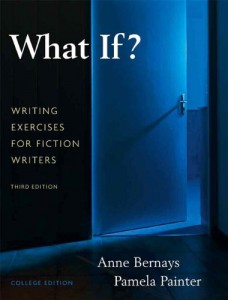by Naomi L. | July 30, 2014 | Blog, Creative Writing |
As creators who take great pride in their craft, all artists constantly need to address questions about their work, and writers are no exception. “What should I write about?” “Who is my target audience?” “How can I make this particular plot work?” At every turn, we need to be aware of potential issues and solutions so that we can produce pieces of the highest possible quality. True, this isn’t always fun; some questions seem to limit our work, while others seem to pull the brakes on it altogether. Yet there is one question that every writer should ask but that many likely take for granted: the infamous “What if?”
Why ask “What if?”
I have memories from my childhood of my mom getting annoyed by my sister constantly asking “What if this?” or “What if that?” But while all the question ever did in her case was stress everyone out, I later came to realize how useful it could be for my fiction. We discouraged my sister from asking “what if” certain things were to happen in our real lives, and with good reason: it’s a terrifying question! But when I asked the same of my characters’ imaginary lives, countless possibilities emerged.
“What if something unexpected were to happen right here?” Then the characters could react in a way that would help establish important development points. “What if this character were to say something to that one?” Then the latter’s response could serve as a Chekhov’s Gun, concealing a clue that could become important later on in the story. “What if they were to go through the forest instead of around it?” Then they could run into a different set of obstacles that might make the story more interesting. You never know what sorts of ideas will pop up until you dare to search for them!
The Start of Something New

There’s a reason this writing exercise book is titled “What If?”!
“What if?” isn’t limited to stories that are already in progress. Sometimes asking the question can be the beginning of a new work altogether. For example, this was the case of one of my most popular stories: a video game fanfiction I wrote when I was 19, titled Generation Beta. The idea for this story came to me one day when I asked myself, “What if my favorite video game characters were to have a future in which they got married and had children?” That started me thinking about said children: what they would look like, what their names would be, how their personalities would develop as they grew older, etc. The next thing I knew, I had created an entire cast of second-generation characters and a handful of potential plots, so I decided to take my brainstorming a step further and write a whole story around them, which I eventually published online. To this day, Generation Beta remains my most read work of fiction, drawing in hundreds of views every month, and it’s all thanks to one simple question I asked in a moment of idle thinking.
If you’re looking for your next big idea, don’t underestimate the power of “What if?” One of your simplest answers to the question may just be the key to a successful new story!
No Obligations, No Worries
The great advantage of the question “What if?” is that it doesn’t tie you to one specific idea, because all you’re really doing is brainstorming without actually committing to anything yet. If a particular line of thought doesn’t feel right, you can discard it as if it never existed – which it technically didn’t anyway – and just go straight back to where you started to try a different path instead. By repeating this process, you can run with as many ideas as you like until you finally find the one that clicks. Handy, right?
So the next time you feel stuck, take a break and ask yourself “What if?” You never know where your trains of thought will take you, but you can be sure it’ll be well worth the ride! Good luck!
by Naomi L. | July 28, 2014 | Blog, Word of the Week |
Word: acerbic
Pronunciation: ə-SƏR-bik
Part of Speech: adjective
Definition: (especially of a comment or style of speaking) sharp and forthright
Source: Oxford Dictionaries
Today’s vocabulary word is another one pulled from the flashcard pile, but that’s the most common place I’ve ever seen it. Truth be told, I can’t actually recall reading the word “acerbic” in a story before (not that I don’t believe I have, but if I ever did, it’s been a long time since). However, I did see it come up several times while studying vocabulary, and since I found it interesting, I decided it was worth adding it to the list.
“Acerbic” speech is that which is straightforward, presumably to the point of being bitter and harsh. In its archaic or technical sense, “acerbic” indicates a sour or bitter taste. The word supposedly arose in the mid 19th century and comes from the Latin adjective acerbus, meaning “sour-tasting”.
Though I’m still unfamiliar with the word in fiction, I have seen various dictionary examples of “acerbic” being used to describe a particularly sharp manner such as wit or attitude. I’ve also seen it used once as an adjective to directly describe a person, though I can’t yet be sure this is correct. Given that its definition regarding sour taste is considered archaic, you’re most likely to encounter it in its more abstract sense. Keep the word “acerbic” in mind if you like to write characters with brutally sharp wits!
What are your thoughts on this word? Any suggestions for future “Word of the Week” featured words?
by Naomi L. | July 25, 2014 | Flash Fiction, J.C. Wolfe's Writing |
No one could believe it when they saw Johnny in first place. He was moving so fast, spectators hardly noticed him the moment he came round the corner. Just two more miles, he thought, then he’d finally prove himself to the whole town. “No one can move like Johnny!” they’d say. “He beat the world record!” Yes, he’d be a champion, and for the first time in his life, everybody would care.
—
No one could believe it when they saw Johnny in first place. He was moving so slow, spectators hardly noticed him the moment he came round the corner. Just two more miles, he thought, then he’d finally prove himself to the whole town. “No one can move like Johnny!” they’d say. “He beat the world record!” Yes, he’d be a champion, and for the first time in his life, nobody would care.
Based on a writing prompt from Writer’s Carnival: Banana Split.
Write a mini scene, no more than 200 words, about anything at all. Then when you’re finished, take two words and swap them with their opposites (for example, you would switch love with hate or cold with hot, left with right, etc.). Try to pick words that will scramble the read and/or make it humorous.
To make my way of thinking clear, I wrote out both versions of this scene: first the original, then the opposite. I hope you enjoy what I’ve written. Thanks for reading!
by Naomi L. | July 23, 2014 | Blog, Creative Writing, Writer's Toolkit |
I’ve already used my Writer’s Toolkit segment to talk about the advantages of keeping a journal and a pocket notebook. Now to complete the trio of handy note-taking tools, today’s topic covers a utility that every prolific writer (especially novelists) should have under their belt: index cards.

Oxford Ruled Index Cards
There probably isn’t much else I can add about the usefulness of index cards that hasn’t already been covered by the journal and the pocket notebook, so instead I’ll briefly cover the advantages they have over both of these. Like the aforementioned items, index cards are great for taking notes, and while they aren’t quite as convenient to carry around as a pocket-size book, they do have a significant feature that makes up for that: separability.
Notebooks are useful for keeping track of ideas as they come to you; the challenge is sorting through those ideas later. Cutting up pages and sticking pieces together doesn’t seem like a very productive way to go about it (unless you’re into scrapbooking, in which case it may actually be fun). A good alternative, therefore, is to scan through the highlights and note those on separate cards. You can categorize your ideas by topic and sort through them anytime to find the most relevant ones for your current project. Essentially, notebooks are for taking with you to jot down ideas on the go, while index cards are for organizing those ideas in your private workspace. How convenient is that?
While every writer can benefit from using index cards this way, novelists get the most use out of them with an additional purpose. If you’ve ever owned a cork board, you may already be familiar with the concept of pinning notes and pictures in an orderly fashion (if you’re like me, though, they’re probably all pinned haphazardly with no discernible pattern whatsoever). In a similar manner, writers planning out a novel can pin index cards to keep track of character profiles, settings and important plot points, so as to get a clear vision of the story as a whole. For writers who are total scatterbrains, this is an excellent habit to pick up!
Summary
Advantages of Using Index Cards
- Easy to sort ideas
- Categorize topics for quick reference
- Keep track of important plot details
- Visualize novel storyline
Index cards are a great option for many writers, but almost a necessity for novelists. Whether you like to set aside the occasional note for future reference or lay out the entire detailed storyline of an upcoming novel, index cards are a useful tool to help you keep your creativity in order!
by Naomi L. | July 21, 2014 | Blog, Word of the Week |
Word: lackadaisical
Pronunciation: la-kə-DAY-zi-kəl
Part of Speech: adjective
Definition: lacking enthusiasm and determination; carelessly lazy
Source: Oxford Dictionaries
Today’s Word of the Week was suggested by my best friend, who used to work with someone who said it all the time. Apparently he’s a big fan of amusing words, and “lackadaisical” certainly fits into that group. I mean, come on, it has the word “daisy” in it! “Lacka-daisy-cal”! Try and tell me that’s not just a little funny. But what’s even funnier is how well it seems to match its definition.
Describing someone or something as “lackadaisical” indicates a lack of determination and enthusiasm. The word is derived from the archaic interjection “lackaday” or “lackadaisy”, alternative forms of the exclamation “alack-a-day” (“an expression of regret or dismay”). This expression contains the root noun/verb “lack” (“the state of being without or not having enough of something”), which possibly stems from the Dutch and German noun lak “deficiency”.
Speaking as someone who has never used the word “lackadaisical” before, I would probably try to work it into a context where I wanted laziness to come across as something funny. It seems like a word that would fit perfectly in humorous writing, so it’s definitely one I’d keep in mind for comedy. If you enjoy writing silly stories about lazy characters, “lackadaisical” is the perfect word for you!
What are your thoughts on this word? Any suggestions for future “Word of the Week” featured words?





Recent Comments